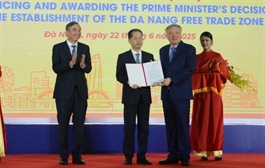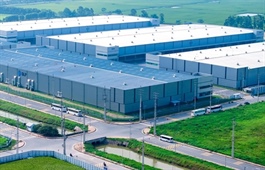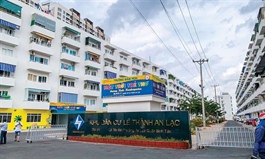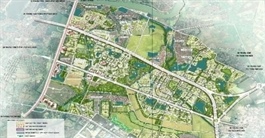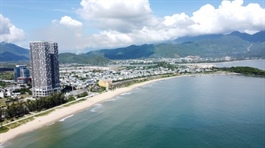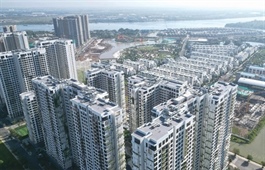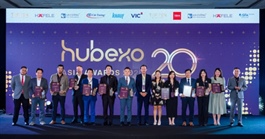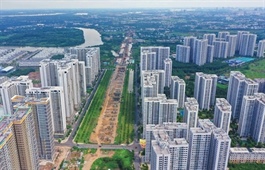Real estate ESG benchmarks required
Real estate ESG benchmarks required
Vietnam’s real estate sector is calling for a unified and locally adapted framework, as the absence of clear criteria has created significant uncertainty for developers in applying sustainable practices and accessing green finance.
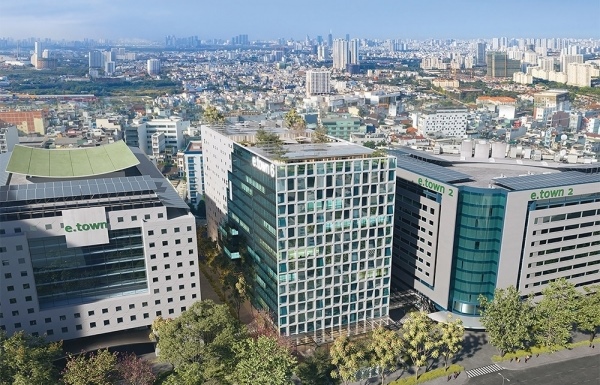
There is a need for Vietnam to scale up its infrastructure to compete with other capital markets, photo Le Toan |
Nguyen Cong Thinh, deputy head of the Department of Science, Technology, Environment and Building Materials under the Ministry of Construction, said at a Hanoi conference last week that environmental, social, and governance (ESG) principles must be embedded in planning, construction, and operations if Vietnam is to meet its net-zero commitments.
The ministry is drafting a circular guiding energy labelling for building materials and promoting low-carbon construction through recycled and non-fired materials.
“A sector-specific ESG benchmark remains missing. Green certification is increasingly a passport to market access and financing, and a national framework would reduce fragmentation and align efforts across stakeholders,” said Thinh.
While policy moves are underway, several developers are already advancing sustainability efforts on their own terms. Phu Long Corporation sees ESG not as a box-ticking exercise but as a core strategic pillar. The company’s Essensia Sky project, EDGE-certified by the International Finance Corporation (IFC), achieves significant reductions in energy, water, and embodied carbon.
“We don’t adopt these practices for branding. We apply them to build healthier, more sustainable living environments that connect people and nature,” the company said.
Becamex Tokyu, operating in Binh Duong, integrates ESG values from master planning to day-to-day operations. Solar power systems, water reuse, thermal insulation, and landscape design are all part of its approach.
“We see this as a long-term cycle, not a single certificate. It’s about measuring performance and improving step by step,” the developer said at the event.
Digital tools such as One Click LCA are helping quantify outcomes, especially environmental impact. With lifecycle assessments and environmental product declarations becoming mandatory in many markets, experts said early adoption in Vietnam could improve competitiveness.
“You can’t manage what you don’t measure,” said Raymond Chan, regional representative of One Click LCA, highlighting the value of transparent data for decision-making and investor trust.
On the financing front, ESG-linked capital flows are becoming more structured, especially in the form of green bonds and sustainable lending.
Nguyen Tung Anh, director of sustainable finance at FiinRatings, suggested that real estate developers should adopt a dual certification strategy, selecting appropriate green building certifications aligned with different capital market expectations. This approach helps optimise access to both domestic banking channels and international financial institutions.
“For companies seeking to issue green bonds, a comprehensive framework is essential. This includes four key pillars: defining the process for identifying and selecting green projects; managing proceeds from green bonds; allocating funds as committed; and conducting periodic reporting on environmental and social impacts,” Anh said.
A robust green finance framework builds investor confidence and is also a prerequisite for integration into capital markets that increasingly prioritise sustainability, he added.
Despite progress from leading firms, challenges remain. Many developers lack guidance on which frameworks to follow. Market awareness is uneven, and the cost of certification or compliance can deter smaller players. The absence of a centralised database also makes tracking and benchmarking difficult.
Participants at the workshop called for a cohesive policy response. This includes establishing sustainability criteria specific to real estate and construction, supported by technical guidance and a carbon database. Building local auditing capacity and linking compliance to access to green credit and tax incentives were also highlighted as priorities. Education and training are needed to ensure principles are understood and applied not just at the executive level, but across design, engineering, and site management teams.
Investor expectations are accelerating change. According to GRESB, over 170 institutional investors globally use its scores as part of due diligence and portfolio selection. While Vietnam currently has limited participation, markets such as Japan and Singapore have near-universal adoption of sustainability benchmarks among listed real estate firms. This growing divide underscores the need for Vietnam to scale up its infrastructure if it is to compete in international capital markets.
Phu Long’s Mailand Hanoi City offers a glimpse of the potential ahead. Positioned as a cultural and smart urban hub, the 300-hectare development integrates ESG values from green infrastructure and wellness design to education and community inclusion. Developed in partnership with UNESCO and UN-Habitat, it sets a new standard for sustainability-aligned urban planning.
According to data from the IFC, Vietnam will need approximately $753 billion by 2030 for climate-resilient infrastructure and urban development projects, most of which could be mobilised from the private sector if a clear national framework is in place.
Nguyen Hoa Cuong, Vice president Institute for Policy and Strategy
As an open economy, Vietnam is not immune to global sustainability trends. Increasing demands from export markets, particularly the EU, are placing significant pressure on Vietnamese enterprises to upgrade their supply chains, raise production standards, and integrate responsible business practices.
Labour-intensive and high-emission sectors like textiles, footwear, and agricultural processing are among those facing stricter technical and sustainability barriers.
While this shift presents challenges, it also opens new opportunities. Three main drivers are accelerating adoption in Vietnam. The first is from investors. Most major investment funds now require disclosure: a recent survey of over 1,600 publicly listed companies showed that only about 25 met global standards – signalling rising selectivity. Moreover, 64 per cent of global investors are willing to pay more for firms with clear sustainability commitments.
Secondly, younger employees are increasingly aware of environmental and social issues, with 74 per cent preferring to work for responsible employers. This creates internal pressure for businesses to improve workplace culture and human resource policies.
Thirdly, around 73 per cent of consumers are willing to pay a premium for responsibly produced goods. These concerns are no longer confined to boardrooms and now influence everyday purchasing decisions.
Yet a major gap remains between awareness and action. Though a 2023 EOB survey indicated that 94 per cent of businesses in Vietnam and Thailand acknowledged the importance of responsible practices, only 25 per cent of local small- and medium-sized enterprises have a formal strategy, and just 21 per cent plan to implement one in the next 2–4 years. Barriers include limited capital, technology, and reporting know-how, with 71 per cent of Vietnamese firms unsure of what data to disclose.
Encouragingly, Vietnam has made high-level commitments, including its net-zero pledge by 2050 and various national strategies on green growth and the circular economy. Resolution 68 by the Politburo is the first to mandate implementation and promote green finance for smaller businesses.
However, Vietnam’s policy framework remains fragmented. In the environmental sector alone, 30–40 legal and strategic documents exist, overwhelming smaller firms. To close the gap between policy and practice, a unified ecosystem is needed – including streamlined regulations, a reliable database, targeted financial support, education, and stronger cross-sector collaboration.
Experts sharing:
Douglas Snyder, executive director Vietnam Green Building Council
Australia’s experience shows that sustainable finance can only scale when there is both top-down policy support and bottom-up market demand. In real estate, this means aligning public incentives with private sector performance, especially through consistent standards and disclosure frameworks.
Over the past decade, Australia has built a strong ecosystem where green building certifications, lifecycle carbon assessments, and sustainability-linked loans are all integrated into real estate decisions. What makes it work is the clarity of metrics and the availability of financial tools to reward good performance.
For Vietnam, the opportunity lies in creating a domestic sustainability taxonomy that connects responsible compliance with access to capital. Green finance should not be treated as a niche instrument, but as a mainstream enabler of resilient infrastructure and urban development. The more transparent and credible the data, the more confidence investors will have.
Equally important is capacity-building – financial institutions, developers, and public agencies need the skills and systems to evaluate green risks and returns. In short, Vietnam can accelerate its sustainability transition by adapting what has worked in markets like Australia, but also by tailoring it to its unique development context.
- 15:12 23/06/2025







